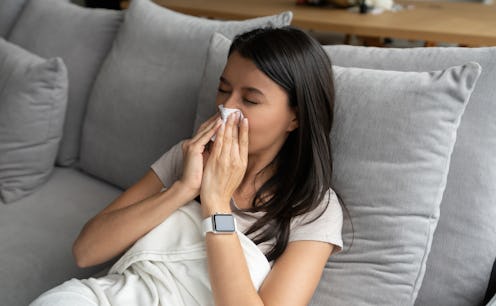
You were so confident that this year's allergy season wouldn't be too bad. You stocked up on tissues and meds, and were ready for an allergy-free sleep. Then, the sun set. If you can't stop your nose from running while you're trying to sleep, you might be asking (between sneezes) why spring allergies are worse at night.
First things first: the whole I'm fine during the day but can't stop sniffling at night thing is not just you, says Dr. Autumn Burnette, M.D., assistant professor in the Division of Allergy and Clinical Immunology at Howard University. "If you suffer from allergies, your symptoms most likely get worse at night," she tells Bustle.
A lot of these nighttime spring allergies have to do with pollen, which is one of the most common causes of seasonal allergies. Just because pollen comes from the outside world, Burnette says, doesn't mean it can't get into your bedroom through your clothes or hair (especially if you don't wash your clothes or shower immediately after coming inside). According to Dr. Natasha Bhuyan, M.D., a family physician with One Medical, some pollen levels peak at night, causing allergic reactions while you're trying to snooze.
Dust mites are another major culprit of terrible nighttime allergies, Burnette tells Bustle. "Dust mites prefer carpeting, some furniture, and bedding to live in. That means they like warmer indoor environments like your bedroom, which is one reason your symptoms may get worse at night." If you're experiencing the coughing, runny nose, sneezing, eye itchiness, and chest tightness that can result from dust mite allergies, Burnette advises removing your carpeting, getting hypoallergenic covers for your pillows, mattress, and box spring, and regularly washing your sheets and bedding (think once a week) in hot water.
Your pets may not be helping too much. "Pet dander, which is skin (as well as urine and saliva) and not fur, can stick to your clothing or bedding and cause allergy symptoms that way," Burnette tells Bustle. "An animal doesn’t even have to be present for a pet dander allergic reaction to take place."
Though it might hurt your heart to ask your pup to sleep in their own bed, it can also help you sleep better, says Bhuyan. Just like with dust mites, hypoallergenic covers for your bedding are also useful with pet dander.
Prepping for bed with your allergies in mind can help, too. "Rinse out your sinuses in the evening with saline or distilled water to clear out any allergen build-up," Bhuyan says, and make sure you're taking the right kind of medicine. "While some people think an antihistamine is a good option at night (especially the ones that make you drowsy), they actually can be disruptive to your sleep cycle. A nasal steroid is a better first-line medication option for allergies."
Burnette also recommends making sure your bedroom is ventilated in the right ways. Try closing the windows and sleeping with an air conditioner with a good filtering system, which can prevent nighttime allergen buildup. Switching your shower time from morning to evening can also help make sure you don't bring any allergens with you to bed. Practicing allergy-aware sleep hygiene like this is super important, because really, no one's trying to lose their zzzs right now.
Experts:
Dr. Autumn Burnette, M.D., assistant professor, Division of Allergy and Clinical Immunology, Howard University
Dr. Natasha Bhuyan, M.D., family physician, One Medical